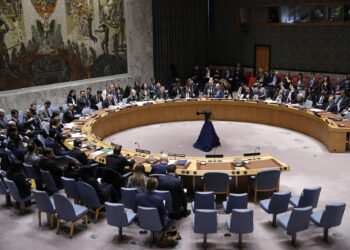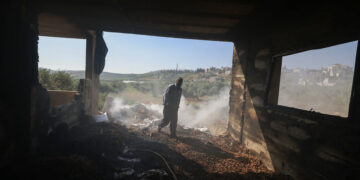Mohamed B. Shaban is the founder and principal partner of MS-Legal Solicitors in London, and the first Libyan to qualify as a solicitor of the Supreme Court of England and Wales.
عربي
The uprisings in the Arab world in 2011 brought with them the hope of a new era of freedom, democracy and justice in a region that was, and in some places continues to be, plagued by oppressive dictators. They not only violated people's human rights, but also stripped their nations of their wealth through corruption at an industrial scale. Citizens were left with inferior public services than they deserve, and which the state could in fact afford to provide, were it not for the graft of those in power. The embezzlement of state assets, by many accounts, has not abated over the past decade across the region, despite the demise of these dictators.
In oil-rich Libya, new leaders commenced rather chaotic, ill-conceived initiatives for recovering vast assets squandered and laundered by Moammar Gadhafi's regime. Yet it was clear from the start that Libya's new leaders had underestimated the scale of the task before them and were ill-equipped, poorly advised and underfunded to pursue the highly complex international hunt and recovery of Libya's stolen wealth.
The National Transitional Council that governed Libya immediately after Gadhafi's ouster—followed by successive interim governments in the years since—haphazardly established, by way of decrees, various committees tasked with tracing and repatriating what they estimated were tens of billions of dollars' worth of embezzled assets. Yet these new authorities had almost no funding and little (admissible) available evidence in court. They also faced opposition from saboteurs who were directly or indirectly implicated in assisting Gadhafi's men launder Libyan assets. Little distinction was made between assets illicitly removed from the country, and those that remained under state ownership but were subject to international sanctions, such as those under U.N. Security Council Resolution 1970, which was imposed against Gadhafi's regime in 2011. These stolen asset committees were ineffective for many reasons, and their status was, and remains, unclear under Libyan law.
Another practical challenge in post-Gadhafi Libya is that insiders to Gadhafi's corruption and crimes had either jumped ship and joined the new authorities, fled the country, been killed or were imprisoned. Apart from a few exceptions, those questioned by these committees chose not to provide admissible evidence and paper trails for the squandering and laundering of state funds. Others concluded dubious settlements with the less scrupulous members of the new Libyan government. Finally, the constant fratricidal political strife of the past 10 years has, naturally, curtailed any progress in recovering Libyan assets from the Gadhafi era.
To many Libyans, liberating themselves from a ruthless tyrant still has not yet resulted in the creation of a government that caters to their needs, let alone can seek accountability for his crimes.
- Mohamed Shaban
Some of those assets are in the United Kingdom, which despite the British government's rhetoric to the contrary, has been and continues to be a hub and beneficiary of flows of corrupt funds through British financial centers and real estate. English law still does not cater specifically for the repatriation of seized illicit assets, although the U.K. is a member of the United Nations Convention Against Corruption, or UNCAC, the only legally binding international anti-corruption treaty. This is not a uniquely British problem, however. According to a recent report by the World Bank's Stolen Asset Recovery Initiative, only 3.3 percent of seized assets have been repatriated to affected nations.
Instead, the U.K. has a myriad of laws and procedures principally based around the Proceeds of Crime Act of 2002, which was later amended by the Criminal Finances Act of 2017 that introduced "unexplained wealth orders," by which a British court can compel individuals to reveal the source of their unexplained wealth. The British government's recently introduced Asset Recovery Action Plan is meant to demonstrate the seriousness of the U.K.'s intention of repatriating stolen assets and clamping down on dirty money. Yet early signs suggest that the policy is achieving more sensationalist political headlines than effectively assisting countries victimized by corruption.
According to a 2019 report by the NGO Global Witness, some 87,000 properties worth approximately £100 billion in the U.K. are registered in the names of shell companies whose real owners are unknown. Even if a small percentage of these owners are kleptocrats, money-launderers, drug kingpins and other criminals, it would amount to a staggering portion of the British real estate market being funded by unknown and dubious sources.
Despite its UNCAC membership and recent laws designed to combat illicit flows of funds into the country, the U.K. has still weighed the scales in favor of kleptocrats and criminals who hide behind the protections afforded to them by other British laws and policies on data protection, privacy, and burdens and standards of proof. They can use these other laws to stall and even prevent genuine asset recovery applications.
What does this mean for recovering Libya's wealth stolen under Gadhafi's dictatorship? The ironic, if depressing, result is that it is easier for a kleptocrat to funnel suspicious funds through the City of London than it is for the State of Libya to freeze those assets and repatriate them to their legitimate owners: the Libyan people.
As the first Libyan national, with dual British citizenship, to be admitted to the roll of the Supreme Court of England and Wales, I was authorized to pursue a number of asset recovery claims before the English courts. My authorization came directly from the State Litigation Directorate, a Libyan agency that was created by Law No. 87 in 1971 and reports directly to Libya's Supreme Judicial Council. The directorate enjoys exclusive right to represent the State of Libya in all local and international civil and arbitration disputes. Although it is staffed by some of the most conscientious Libyan lawyers I have worked with, the State Litigation Directorate nevertheless suffers from a lack of government funding and support from other key governmental agencies that are, or should be, more active in the struggle for Libya's asset recovery.
The first asset recovery case in the world following the Arab Spring to reach any court was the "State of Libya v Capitana Seas Limited." On March 9, 2012, Justice (now Lord) Andrew Popplewell ruled in Libya's favor by finding that Gadhafi's son, Saadi, had bought a £10 million mansion in London through the misappropriation of Libyan state funds, and had registered the property in the name of an off-shore company, in order to hide his beneficial interest. The British court's ruling signaled the end of the era of impunity for dictators and their families who loot state resources for their personal benefit.
In another case that is ongoing in the U.K.—"Executive Authority for Special Flights v Prime Education Ltd & Others"—we secured a judgment in February of this year for £15 million against the first defendant for breaching an "agreement" in which a Libyan official paid a British company a lump sum of state money in return for training Libyan pilots. When the pilots were unable to attend their training sessions, due mainly to visa restriction, that official willfully or foolishly entered into a subsequent "contract" in which he "gifted" the £15 million to the defendants, who then proceeded, without authority, to "invest" the funds in speculative real estate projects in Istanbul—losing, thus far, over half of the value of the investment. The Libyan official's actions breached several Libyan laws on economic crimes and state finances. The British counterparts breached English contract law on "lack of consideration," as well as other more serious matters, such as dishonesty, breach of fiduciary duties and unjust enrichment. These latter issues will be determined at a trial later this year.
Two other cases involve the looting of precious artifacts, which is a matter of growing concern in the Middle East. Such historic treasures are incalculable in financial value, as their theft deprives people of their very cultural heritage and identity. Back in 1990, the head of a Roman statue of the Princess Flavia was looted from the UNESCO-protected site of Sabratha, west of Tripoli. It miraculously appeared at a Christie's auction in London years later, in April 2011, during the peak of the violence that engulfed Libya before Gadhafi was ousted. The statue, which was falsely marketed as originating from Egypt and allegedly owned by a wealthy Swiss family since 1975, was sold to an unsuspecting Italian arts collector. But for the invaluable intervention of Libyan and Italian archaeologists, that could have ended hope of Princess Flavia returning home. With their expert reports, we presented the evidence of the provenance of the artifact to Christie's. So glaring was their error, the auctioneers chose not to challenge us; instead, they tracked down the Italian buyer and compensated him. The statue of Flavia then flew back to Tripoli aboard the Italian prime minister's own plane in December 2011.
That same year, a life-size, 2,000-year-old marble statue of the ancient Greek goddess Persephone was illegally excavated from the UNESCO-protected site of Cyrene, near present-day Shahat in eastern Libya. The looters later transported the well-preserved statue via Turkey to the U.K., where it was seized at London's Heathrow Airport in 2013 by British customs.
A decade after the end of Gadhafi's dictatorship, money that ultimately belongs to the Libyan people and should be used to improve public services—for everything from education to health care to the energy supply—is instead still being used to grease the wheels of financial centers and real estate speculators around the world.
- Mohamed Shaban
Initially, Her Majesty's Revenue and Customs were of the mistaken belief that the statue originated from Iraq. But following inspections by experts from the British Museum, it was confirmed that the statue was from Cyrene. The trial for the forfeiture on Sept. 1, 2015 concluded that the courier of the statue, a Jordanian national, and his sponsors, a company in the United Arab Emirates called Hasan Fazeli Trading Co LLC, had deliberately misdeclared its provenance and provided false documentation, claiming that the statue originated from Turkey. They also claimed that the value of the statue was only 10 percent of its real auction price, so as to reduce the customs' bill. A London court ordered that the statue be forfeited by British customs authorities under the Customs and Excise Management Act of 1979. Following negotiations, they agreed to surrender the statue to the Libyan government.
Most recently, we have focused our resources on defending Libya in international investor arbitration disputes, as these claims are worth hundreds of millions of dollars. Because arbitration is a private dispute resolution procedure, unlike public litigation in court, it is subject to confidentiality rules. Suffice to say that in the process of defending these cases, a pattern of eye-watering levels of corruption has been uncovered in the underlying contracts involving Libyan officials and their so-called "investor" counterparts.
The lack of successful asset recoveries following the Arab uprisings have led some commentators, especially those who long for the supposed "stability" of these dictators, to claim that there was very little embezzlement of state assets by the fallen regimes. This is untrue. There are many reasons for the failures to recover misappropriated assets so far, starting with the power vacuum and instability unleashed when one-man rulers like Gadhafi were finally gone. He had systematically destroyed any state institutions that could hold his regime to account. After his demise, Libyan entities that could pursue justice and accountability barely existed, or were so degraded as to be dysfunctional.
The new interim governments, understandably, prioritized existential threats to Libya, as the country was engulfed in civil war and became a hub for terrorist groups like the Islamic State. These governments lacked the expertise and funding to pursue asset recovery cases abroad, and they have still not taken full advantage of international training programs to tackle corruption, such as those offered by the World Bank, as well as by NGOs such as Transparency International. Worse, post-Gadhafi governments have been infiltrated by some of the same venal characters who helped his regime misuse and launder the nation's wealth in the first place.
In the U.K., where so much of Libya's wealth has been hidden, the government has been less than helpful, setting an unrealistically high bar for fledgling democracies like Libya to overcome in order to attract needed financial assistance to pursue the costly asset recovery cases in British courts. Despite the British government paying lip service to combating illicit flows of money, London remains a magnet for kleptocrats.
A decade after the end of Gadhafi's dictatorship, money that ultimately belongs to the Libyan people and should be used to improve public services—for everything from education to health care to the energy supply—is instead still being used to grease the wheels of financial centers and real estate speculators around the world. Unless the new Libyan government is prepared to invest in asset recovery—by training its agents, funding investigations and commencing legal action, both civil and criminal—the Libyan people will continue to suffer from the effects of the theft of their treasures. To many Libyans, liberating themselves from a ruthless tyrant still has not yet resulted in the creation of a government that caters to their needs, let alone can seek accountability for his crimes.







































